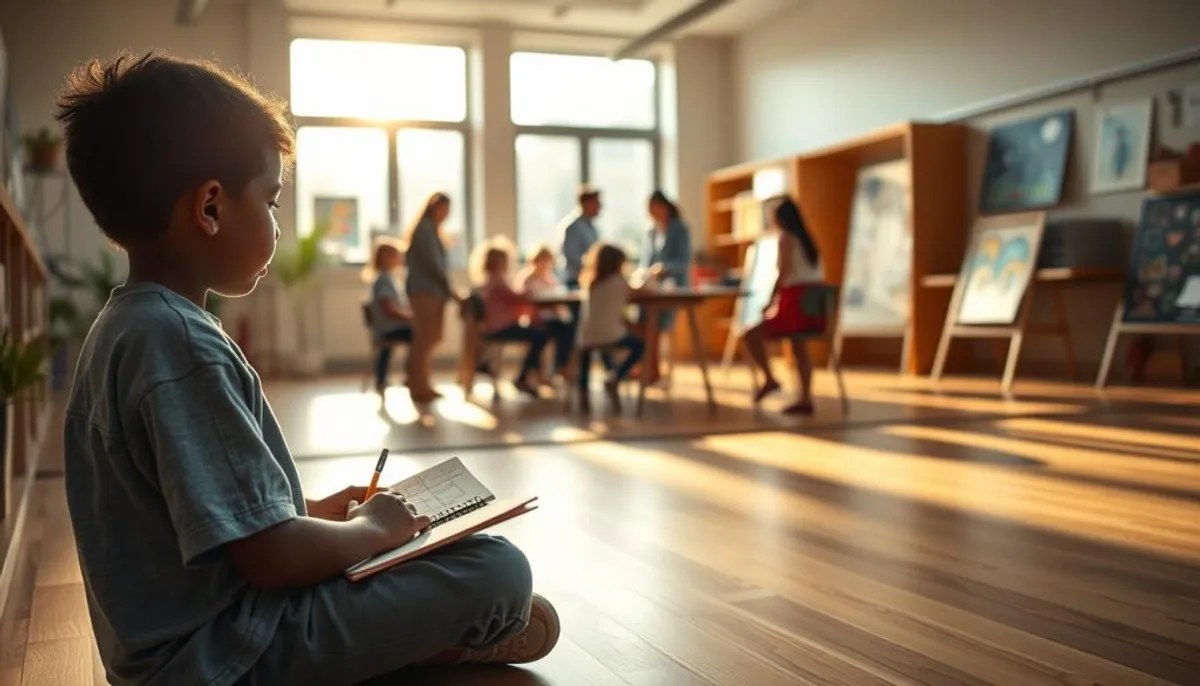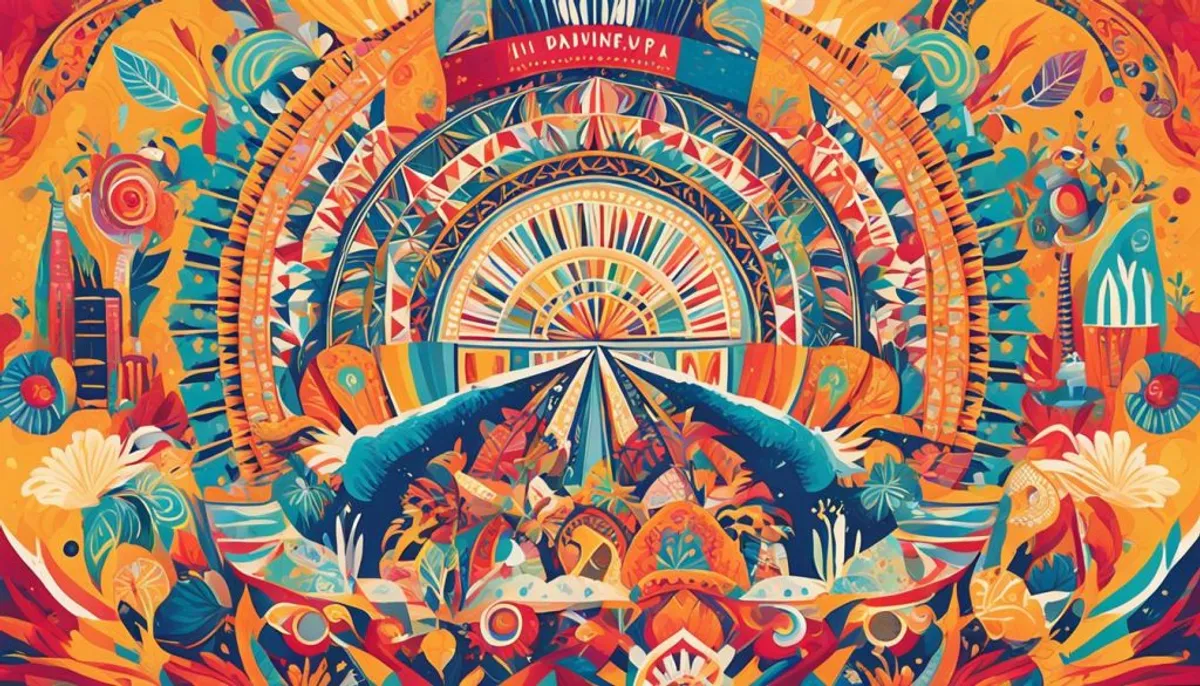Culture is fundamental to the development of humanity. It transcends simple rules, presenting itself as a constantly evolving process. This phenomenon raises questions about the impact of culture on our humanity and its role in our society.

Intellectuals like Rousseau and Nietzsche have expressed doubts about culture. Yet, 68% of individuals believe it is essential for the development of human values. This optimistic view is supported by research showing that cultural engagement enhances social skills and morality.
The debate about human nature and its interaction with culture remains lively. Sartre argues that our existence precedes our essence, while Aristotle proposes that we are born with dispositions that evolve over time. These ideas prompt us to examine how culture influences our identity and social behavior.
The fundamental process of humanization through culture
Culture is crucial for the humanization of the individual. This complex process involves education, the development of abilities, and the acquisition of social values. Cultural traditions and artistic expression shape our identity and our understanding of the world.
The transformation of human nature through education
Education is central to humanization. Kant emphasizes its importance, distinguishing discipline, the “negative part,” from instruction, the “positive part.” This approach aims to develop essential human qualities and prepare the individual to live in society.

The development of intellectual and moral capacities
Culture stimulates our intellectual and moral capacities. It pushes us to think, analyze, and take a critical look at the world. This development is crucial for our personal and collective evolution, allowing us to adapt to the challenges of our time, notably through art forms such as Malagasy craftsmanship.
The acquisition of social and cultural values
Immersion in a culture allows for the acquisition of essential social values. Cultural diversity enriches this process by offering a multiplicity of perspectives. Cultural traditions transmit ancestral knowledge, while artistic expression invites us to explore our common humanity.
This process of humanization through culture is continuous and dynamic. It transforms us into beings capable of understanding, appreciating, and contributing to the richness of our collective cultural heritage.
How culture humanizes man
Culture is essential to the humanization of the individual. It shapes our cultural identity and conveys crucial humanist values. This complex process involves several fundamental aspects.
The role of discipline and instruction
Discipline and instruction are pillars of our social evolution. They teach us to live in society, to respect rules, and to develop our critical thinking. This education enables us to acquire the necessary skills to navigate the modern world.

The impact of traditions and cultural heritage
Our cultural heritage is a treasure of experiences and wisdom accumulated over generations. It forges our collective and individual identity. Traditions, whether familial or societal, anchor us in a common history and provide us with essential reference points.
The transmission of knowledge and skills
Culture is perpetuated through the transmission of knowledge and know-how. This intergenerational sharing ensures the continuity of our cultural heritage while enriching it. It allows each individual to flourish and contribute in turn to the evolution of society.
| Cultural Aspect | Impact on Humanization |
|---|---|
| Discipline and instruction | Development of critical thinking and social skills |
| Traditions and heritage | Formation of cultural identity and social reference points |
| Transmission of knowledge | Perpetuation and enrichment of humanist values |
In conclusion, culture is the fertile ground where our human qualities flourish. It guides us towards a deeper understanding of ourselves and others, thus nourishing our humanity.
Cultural manifestations as vectors of humanization
Cultural manifestations are essential for human development. They help man to grasp and explain his environment. Art, literature, music, and traditions are key means of expression. They contribute to our understanding of ourselves and the world around us.
Cultural education fosters empathy, creativity, and critical thinking. These qualities are fundamental to our humanity. They distinguish us from other species. Culture is transmitted from generation to generation, enriching our heritage.
Anthropologists have studied culture for over a century. It encompasses mental patterns, behaviors, customs, and ideals. This approach highlights the close link between culture and humanization.
| Cultural Aspect | Impact on Humanization |
|---|---|
| Art | Development of sensitivity and personal expression |
| Literature | Enrichment of language and thought |
| Music | Emotional and cognitive stimulation |
| Traditions | Transmission of values and strengthening of social bonds |
Cultural manifestations allow us to transcend our biological nature. They offer means to explore our humanity. Cultural education is therefore a fundamental pillar of human development.
Artistic expression and the development of human identity
Artistic expression is fundamental to the development of our cultural identity. It allows us to explore our humanity in a unique way. It transcends words to express our deepest emotions and thoughts.
The arts as a means of exploring humanity
Art offers a window into our human nature. As Georges Bataille's analysis of the Lascaux cave drawings shows, art allows man to dream and understand the world. These prehistoric works testify to our relentless quest for meaning and our need to leave a mark.
Cultural creation and personal flourishing
Cultural creation greatly contributes to our personal flourishing. It allows us to develop our creativity and express our individuality. By creating, we explore our emotions, ideas, and values, thus shaping our identity.
The role of artistic practices in society
Artistic practices play an essential role in our society. They foster mutual understanding and challenge our perceptions. They stimulate intercultural dialogue. Art thus becomes a powerful vector of social cohesion and cultural development.
| Aspect of Artistic Expression | Impact on Human Identity |
|---|---|
| Exploration of humanity | Understanding of self and the world |
| Cultural creation | Personal flourishing and creativity |
| Artistic practices | Social cohesion and intercultural dialogue |
Conclusion
Culture is crucial for human development. It shapes our identity, values, and understanding of the world. By offering adult dance classes and transmitting knowledge, skills, and traditions, it allows us to flourish as social beings.
History reveals that the quest for humanization through culture is a continuous process. From the Renaissance to the Age of Enlightenment, the idea that education and culture can perfect man has persisted. Despite the challenges of global conflicts, this vision remains relevant today.
Culture offers us tools to transcend our instinctive nature. It helps us develop our morality, creativity, and wisdom. The arts, in particular, play a crucial role in exploring our humanity and expressing our identity.
Ultimately, culture is not a luxury but a necessity for our full human development. It allows us to transcend our individual limits and participate in a larger community. By cultivating a rich and diverse cultural environment, we support not only our own growth but also that of society as a whole.
RelatedRelated articles


